现代大学英语第三册第一单元(精)
现代大学英语精读3Unit1市公开课一等奖百校联赛获奖课件
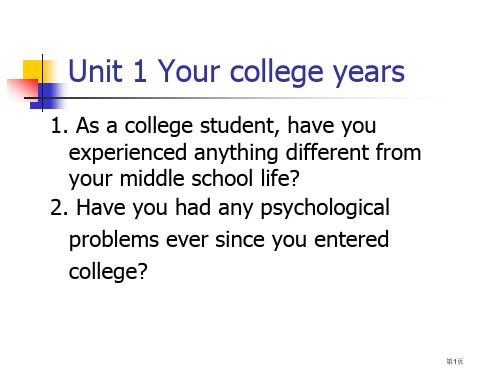
para7
internalize: to make faith, value, morals, attitudes, behavior, language etc. part of your nature by learning or assimilating them unconsciously.
第10页
First, there is functional independence, which involves the capability of individuals to take care of practical and personal affairs, such as handling finances, choosing their own wardrobes, and determining their daily agenda.
anxiety: They are anxious because they are eager to please their parents.
mistrust: They sometimes feel unhappy because they think their parents are not fair to them.
第1页
What is the main idea of para1?
Many key changes happen to college students during their college years.
第2页
What can you learn from para1?
Three expressions of “Have you thought about…?”
现代大学英语精读第3册lesson 1课件

What does “it” refer to? What does “to heighten” mean?
“It” here refers to the word “struggle” in the previous sentence. “to heighten” means to become stronger or intensified.
Background Information
This text is addressed to college students about what they will experience in their “college years”. It is particularly appropriate now as we are just beginning the second academic year, which is the most important in our college life. With our first year’s experience we can better understand the issues involved and the effective ways to deal with them.
Structure of the Text Part I (para.1-4): theoretical analysis on adolescent’s developmental changes Part II (para.5-9): specific changes that college students would face Part III (para.10): brief summary of importance of college time
现代大学英语(精读)笫三册——lesson(1).ppt

(2)reflective通过用词来折射 ◎The nation that sent more than 9 million people to college on the GI Bill is now pricing a college education out of reach of its young people. Instead, we have spawned(造就)an unskilled, poorly educated class that requires extensive social support and contributes little to the economy.
To a kid, a savings account is just a black hole that swallows birthday checks.
Dragging Space and Time The results of two studies announced in early November 1997 provide unprecedented support for “frame-dragging,” a concept predicted by physicist Albert Einstein's general theory of relativity. Frame-dragging describes how massive objects actually distort space and time around themselves as they rotate. One of the studies examined frame-dragging around black holes, an example of which is shown here in an artist's conception.
现代大学英语精读3 Unit 1 课文 翻译及课文知识重点
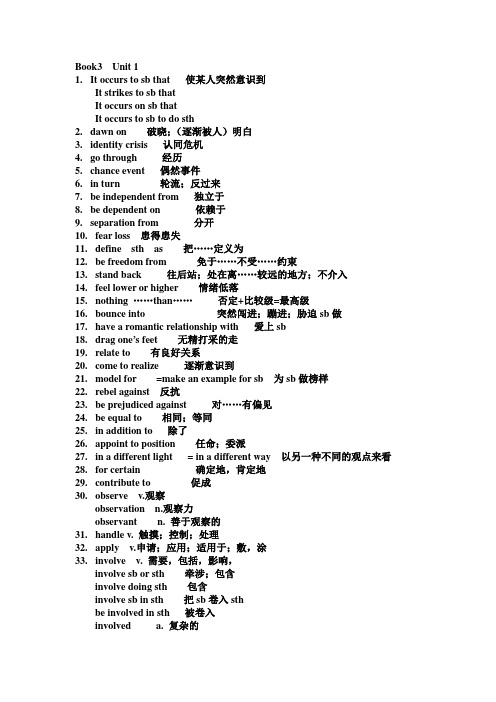
Book3 Unit 11.It occurs to sb that 使某人突然意识到It strikes to sb thatIt occurs on sb thatIt occurs to sb to do sth2.dawn on 破晓;(逐渐被人)明白3.identity crisis 认同危机4.go through 经历5.chance event 偶然事件6.in turn 轮流;反过来7.be independent from 独立于8.be dependent on 依赖于9.separation from 分开10.fear loss 患得患失11.define sth as 把……定义为12.be freedom from 免于……不受……约束13.stand back 往后站;处在离……较远的地方;不介入14.feel lower or higher 情绪低落15.nothing ……than……否定+比较级=最高级16.bounce into 突然闯进;蹦进;胁迫sb做17.have a romantic relationship with 爱上sb18.drag one’s feet 无精打采的走19.relate to 有良好关系e to realize 逐渐意识到21.model for =make an example for sb 为sb做榜样22.rebel against 反抗23.be prejudiced against 对……有偏见24.be equal to 相同;等同25.in addition to 除了26.appoint to position 任命;委派27.in a different light = in a different way 以另一种不同的观点来看28.for certain 确定地,肯定地29.contribute to 促成30.observe v.观察observation n.观察力observant n. 善于观察的31.handle v. 触摸;控制;处理32.apply v.申请;应用;适用于;敷,涂33.involve v. 需要,包括,影响,involve sb or sth 牵涉;包含involve doing sth 包含involve sb in sth 把sb卷入sthbe involved in sth 被卷入involved a. 复杂的involvement n. 牵扯;财政困难34.border issue n. 边境问题35.settle dispute 解决争端36.transport gas from sth 传输气体37.see to it 处理;照顾38.critical condition 危险期39.leave it aside 搁置;不考虑leave sb/sth behind 未能/忘记带…leave off 停止leave sth. off 不再穿某物leave it out 忽略;不提及leave sth over 推迟某事40.look at = look into 调查look up 仰视;改善look sth up 查阅(字典,参考书中)look sb up 看望或接触sblook ahead 计划未来look down upon 瞧不起look upon …as 把……视为41.set to 开始精力充沛的做sthset about doing 开始做sthset out to do 开始做sthset out sth 陈述sth42.sent out 派遣43.be content with 知足的44.be free from 摆脱45.interact with 与……相互作用Translation1.她打算申请那个学术工作。
现代大学英语 精读3(第三版)教学课件B3U1.pptx
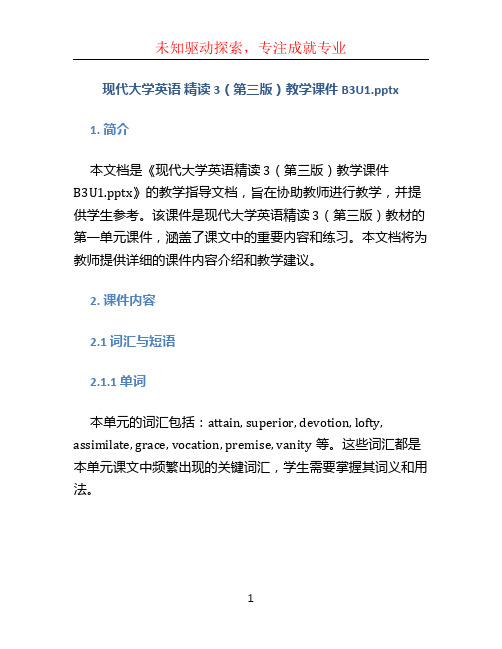
现代大学英语精读3(第三版)教学课件B3U1.pptx1. 简介本文档是《现代大学英语精读3(第三版)教学课件B3U1.pptx》的教学指导文档,旨在协助教师进行教学,并提供学生参考。
该课件是现代大学英语精读3(第三版)教材的第一单元课件,涵盖了课文中的重要内容和练习。
本文档将为教师提供详细的课件内容介绍和教学建议。
2. 课件内容2.1 词汇与短语2.1.1 单词本单元的词汇包括:attain, superior, devotion, lofty, assimilate, grace, vocation, premise, vanity等。
这些词汇都是本单元课文中频繁出现的关键词汇,学生需要掌握其词义和用法。
2.1.2 短语本单元的短语包括:be indicative of, bring out, take…seriously, measure up to, in good part等。
教师可以通过例句和实例来帮助学生理解这些短语的含义和用法。
2.2 阅读理解本单元的阅读理解部分涵盖了三篇文章,分别是《选择正确的途径》、《智慧的力量》和《忠诚的战士》。
教师可以通过课件中的题目和文字说明帮助学生理解文章内容,并进行讨论和解答相关问题。
2.3 语法与写作本单元的语法重点是介词和非谓语动词的用法。
教师可以利用课件中的例句和练习来讲解和巩固学生对这些语法知识的掌握。
此外,课件还包括写作部分,教师可以引导学生根据所学的语法知识写作相关的练习作文。
3. 教学建议3.1 教学方法教师可以采用多种教学方法来教授本单元内容,如讲解法、示范法和讨论法等。
在讲解词汇和短语时,可以先通过示范法来引导学生正确使用,然后进行讨论和实践。
在阅读理解部分,可以采用讨论法来引导学生分析文章内容,并提出自己的见解和观点。
在语法与写作部分,可以通过讲解法和实践法相结合,引导学生掌握语法知识,并培养写作能力。
3.2 学生活动教师应鼓励学生积极参与课堂活动,并提供一些学生活动的建议,如词汇卡片制作和交流、小组讨论、写作练习等。
现代大学英语精读3unit 1
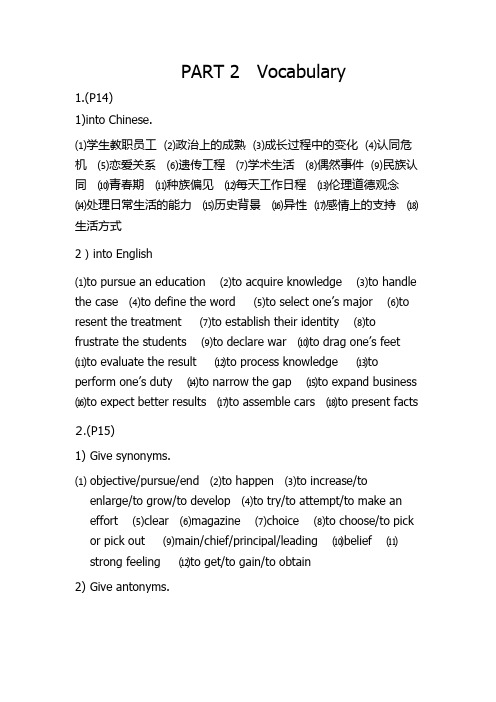
PART 2 Vocabulary1.(P14)1)into Chinese.⑴学生教职员工⑵政治上的成熟⑶成长过程中的变化⑷认同危机⑸恋爱关系⑹遗传工程⑺学术生活⑻偶然事件⑼民族认同⑽青春期⑾种族偏见⑿每天工作日程⒀伦理道德观念⒁处理日常生活的能力⒂历史背景⒃异性⒄感情上的支持⒅生活方式2)into English⑴to pursue an education ⑵to acquire knowledge ⑶to handle the case ⑷to define the word ⑸to select one’s major ⑹to resent the treatment ⑺to establish their identity ⑻to frustrate the students ⑼to declare war ⑽to drag one’s feet ⑾to evaluate the result ⑿to process knowledge ⒀to perform one’s duty ⒁to narrow the gap ⒂to expand business ⒃to expect better results ⒄to assemble cars ⒅to present facts⒉(P15)1)Give synonyms.⑴objective/pursue/end ⑵to happen ⑶to increase/toenlarge/to grow/to develop ⑷to try/to attempt/to make aneffort ⑸clear ⑹magazine ⑺choice ⑻to choose/to pick or pick out ⑼main/chief/principal/leading ⑽belief ⑾strong feeling ⑿to get/to gain/to obtain2)Give antonyms.⑴masculine ⑵immature ⑶independence ⑷inferior ⑸incompetent ⑹minor ⑺to narrow ⑻innocence ⑼to exclude ⑽disapproval ⑾mistrust/distrust ⑿inequality ⒀to discourage ⒁to grow/to increase/toexpand/to develop ⒂indistinct/unclear/vague ⒃impractical/unpractical/theoretical⒊(P15)1)handle 2)occurrence 3)handle 4)involved5)observant/occurrence 6)observation/observed/occur 7) involve 8) application 9)occurred/apply10)observers/handled 11)involvement 12)observation⒋(P16)⑴She intends to apply for that academic position.⑵He is so devoted to his research that idea that he willsoon have to retire never occurs to him.⑶Many people have observed that , without effectivechecks, we have a tendency to abuse our power.⑷Students must observe carefully how good writers usewords.⑸Some countries refuse to get involved in this dispute andthey resent any foreign interference.⑹How do you think we should handle the drug problem?⑺According to the agreement, all business policies apply toeverybody without any prejudice.⑻The control of the and storms will involve a tremendousamount of work and money.⑼You have to take into consideration the local conditionwhen you apply these technologies.⑽All applicants will have to fill out this form and mail in an application fee of 50 dollars.⑾Based on his careful observation of children’s behavior he came to the conclusion that learning is a naturalpleasure.⑿In a country of many nationailities, ethnic harmony requires very careful handling.⒀The government is determined to punish all the corrupt officials involved.⒁Cheating at exams dose not occur very often. But when it dose, the school takes a very tough position.5.(P16)⑴C ⑵A ⑶B ⑷A/D ⑸B ⑹D ⑺D ⑻A ⑼B ⑽C⑾A ⑿C ⒀D ⒁A ⒂B ⒃D ⒄A ⒅D6.(P18)1)⑴object ⑵objective ⑶objective ⑷objective ⑸objects2)⑴requires ⑵requires ⑶acquire ⑷acquire ⑸inquire3)⑴entrusted ⑵entrusted ⑶trust ⑷believe ⑸trust4)⑴repaid ⑵pay,repay ⑶place ⑷repay ⑸placed,replaced5)⑴anxious ⑵anxiously ⑶eager ⑷eager/anxious ⑸eager/anxious7.(P19)⑴suggested ⑵primarily ⑶told ⑷but ⑸remained ⑹consisted ⑺eventually ⑻regrets ⑼pursuing ⑽what ⑾where ⑿Although ⒀derive ⒁lacking ⒂droppingPART 3 Grammar⒈(P20)1)them: pronoun2)who they are and what their strengths and weaknesses are:two wh-clauses3)to enter the work world: an infinitive phrase4)that there are four distinct aspects to psychological separationform one’s parents: a that-clause5)where they are in the independence/dependence struggle: awh-clause6)how to give and receive affection in the adult word: a wh-clause7)very little: pronoun8)how they react to new knowledge and new ways of learning,how they process the knowledge presented to them, and how they organize this knowledge: three wh-clause9)shuddering: a gerund10)drifting down: a gerund phrase11)herself: a reflective pronoun12)how to let loose a plague capable of destroying wholenations: wh-word + to-infinitive13)what to say: wh-word + to infinitive14)whether it had been storming for three or four days: a nounclause introduced by “whether”15)(need) charity: a noun; (help) themselves: a reflexivepronoun; (told) Millard: a proper noun2.(P)1)Complete the sentences with one appropriate word.⑴what ⑵yourself ⑶what ⑷whether ⑸it ⑹others ⑺why ⑻which/how ⑼everything ⑽much3)Choose the right form.⑴feeling ⑵to change ⑶becoming ⑷being; being/to be⑸to go ⑹thinking ⑺to stay ⑻not to see ⑼havingfallen behind ⑽being recongnized4)Translate.⑴In the negotiations, the two sides found they had little incommon.⑵More and more old people are learning how to surf/use theInternet.⑶Don’t forget to write down your name on the exam paper.⑷We must bear in mind that there is no shortcut in learning.⑸He never regretted having shifted from business to politics.⑹I’d like to have a chat with you about your term papersometime this week.⑺Like sports, learning a foreign language requires a lot ofpractice.⑻They all remember where they were when they heard theshocking news.⑼People learn little from victory, but much more from defeat.⑽Whenever you face a decision you have three choice: do what you please; do what others do; or do what is right.3.(P22)1),6)the way + clause = the way in which + clause2),3),8)a way/the way(s) + to-infinitive phrase (referring toan activity in a specific way)4),5),7)a way/the way(s) + of + gerund noun (referring to anactivity in a general way)But in many cases, the difference between “a/the way to do sth.” and “a/the way of doing sth.” is blurred. The choice israther a matter of idiomatic usage.4.(P22)⑴a poet’s way of telling us ⑵the only way to learn a foreign language well ⑶no easy way to say good-bye ⑷the way they all stared at me ⑸some aspects of the way we speak ⑹(many) ways to get data into a computer ⑺The way I judge it ⑻a way of delivering the secret message ⑼a way to stop the leak ⑽the way the children responded to their questions5.(P23)a, this, a, this, an, The, the/a, a, the, the, The, the, /, The, his, the, the6.(P23)⑴D ⑵C ⑶A ⑷D ⑸B ⑹D ⑺A ⑻B ⑼D ⑽B ⑾C ⑿B ⒀A ⒁C ⒂AWRITTEN WORKIn that way, according to the writer of the article, is college a time of growth and expansion?College life is an important period in one’s life. Although the college students seldom think about that the key changes will probably happen to them during their college years.During this time, students are going through an identity crisis which includes independence/dependence struggle from their parents. And also, the most important thing is establishing their sexual identity. At the same time, these youngsters are learning how to give and receive affection in the adult word. What’s more, they establish their personal and social identity. They are a affirming their personal values such as religious faith, moral and ethical values and developing new ways to organize and using the academic knowledge as well as their world knowledge.In a word, college students can be growing in their understanding of themselves, others and world in which they lives.。
现代大学英语精读三课后第一单元答案
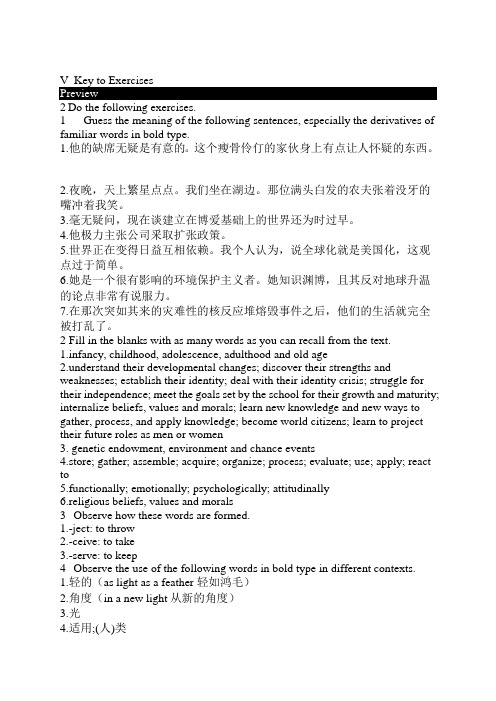
V Key to Exercises2 Do the following exercises.1 Guess the meaning of the following sentences, especially the derivatives of familiar words in bold type.1.他的缺席无疑是有意的。
这个瘦骨伶仃的家伙身上有点让人怀疑的东西。
2.夜晚,天上繁星点点。
我们坐在湖边。
那位满头白发的农夫张着没牙的嘴冲着我笑。
3.毫无疑问,现在谈建立在博爱基础上的世界还为时过早。
4.他极力主张公司釆取扩张政策。
5.世界正在变得日益互相依赖。
我个人认为,说全球化就是美国化,这观点过于简单。
6.她是一个很有影响的环境保护主义者。
她知识渊博,且其反对地球升温的论点非常有说服力。
7.在那次突如其来的灾难性的核反应堆熔毁事件之后,他们的生活就完全被打乱了。
2 Fill in the blanks with as many words as you can recall from the text.1.infancy, childhood, adolescence, adulthood and old age2.understand their developmental changes; discover their strengths and weaknesses; establish their identity; deal with their identity crisis; struggle for their independence; meet the goals set by the school for their growth and maturity; internalize beliefs, values and morals; learn new knowledge and new ways to gather, process, and apply knowledge; become world citizens; learn to project their future roles as men or women3. genetic endowment, environment and chance events4.store; gather; assemble; acquire; organize; process; evaluate; use; apply; react to5.functionally; emotionally; psychologically; attitudinally6.religious beliefs, values and morals3 Observe how these words are formed.1.-ject: to throw2.-ceive: to take3.-serve: to keep4 Observe the use of the following words in bold type in different contexts.1.轻的(as light as a feather 轻如鸿毛)2.角度(in a new light从新的角度)3.光4.适用;(人)类5.申请;(速度)比赛6.项目;轻(工业)7.赛跑;项目8.预计;利用9.展现出(某种形象)5 Give synonyms of the following words.1.aim/purpose/objective2.try/attempt3.clear4.chief/main5.magazine6.belief7.alternative/choice8.feeling6 Give antonyms of the following words.1.incompetent2.innocent3.distrust/doubt4.discourage5.indistinct6.narrow7.disapproval8.inequality9.expand10.impractical1 Translate the following expressions. Into English1.define the word2.resent the treatment3.frustrate the students4.declare war5.evaluate the result6.perform one’s duty7.narrow the gap8.expand business9.present the factsInto Chinese1.认识自己的优缺点2.进入职场3.学会管理个人财务4.凡亊都得请父母做主5.为我们将来如何扮演男人或女人的角色作准备6.逐步培养和建立自己的宗教信仰、道德和价值观念7.学会选择着装8.确定个人身份9.怀疑并反抗旧观念10.向权威叫板和挑战Fill in the blanks with the proper form of the appropriate words listed below.1.occurrence, occur2.applied, applicants, pursuits, occurring3.involves, handled, handling, pursue4.observant, occurrence5.observation, observed, occur6. handle, occurred7. observe, application8. occurred, involvement9. observers, handled10. observationTranslate the following sentences into English.l He is so devoted to his research that it never occurs to him that he will soon have to retire.2.Many people have observed that, without effective checks,we all have a tendency to abuse our power.3.Some countries refuse to get involved in this dispute and they resent any foreign interference.4.The control of sand storms will involve a tremendous amount of work and money.5.You have to take the local conditions into consideration when you apply these technologies.6. All applicants will have to fill out these forms and mail in an application fee of 50 dollars.7.Based on his careful observation of children’s behavior, he came to the conclusion that learning is a natural pleasure.8.In a country of many nationalities, ethnic harmony requires very careful handling.9.The government is determined to punish all the corrupt pfficials involved.10.Cheating at/on exams does not occur very often. But when it does, the school takes a very tough position.Fill in the blanks with appropriate words.1.C2.B3.C4.A5.C6.D7.A8.B9.D10.AChoose the right words in their proper forms.1 1. object 2. objectives 3. objective 4.objective 5. objects2 1. requires 2. requires 3. acquire . 4 acquire 5. inquire3 1.entrusted 2.entrusted 3. trust 4.believed, believed 5. trust4 1. repaid 2. pay, repay 3. place 4.repay . 5. placed, replaced5 1. anxious 2. anxiously 3. eager 4.eager/anxious 5. eager/anxious1 Study the uses of the conjunction while in the following sentences and put eachinto a category listed below.Category a: 3, 6,8 Category b: 1,9Category c: 4,7 Category d: 2,5,102 Learn to use parallelisms.1.Recognize parallel structures in each of the following sentences and underline them.1.A moment’s insight is sometimes worth a life’s experience.2.There are no victories without conflicts, no rainbow without a cloud and a storm.3.A house without books is like a room without windows.4.Youth is not a time of life—it is a state of mind. You are as young as your faith, as old as your doubt.5.Success is to be measured not so much by the position that one has reached in life as by the obstacles which he has overcome while trying to succeed.6.The purpose of the university is to make students safe for ideas—not ideas safe for students.7.Courage is resistance to fear, mastery of fear—not absence of fear.8.What the superior man seeks is in himself: what the small man seeks is in others.9.One measure of friendship consists not in the number of things friends can discuss, but in the number of things they need no longer mention.10.Rather than love, than money, than fame, give me truth.2 Complete the sentences by putting in the blanks appropriate words.1. price2. ignorance3. problems4. the harvest5. leap6.means7. for ourselves8. forgetting9. hope 10. pessimist3 Study the grammatical structure of these involved sentences.1.This is a complex sentence.Subject: IPredicate verb: had come to realizeQualifier: during the course (an adverbial modifying the predicate verb) Object clause: while my world... his options narrow (a clause introduced by “that”)In the object clause:Main clause: my father was seeing his world shrink and his options narrow Qualifier: who was in his sixties (a non-restrictive relative clause mod ifying “my father”) Subordinate clause: while my world was expanding and new options were opening for me (an adverbial clause introduced by "while,"used to contrast the son’s condition with the father’s)2.This is also a complex sentence.Subject: this studentQualifier: who considered herself intelligent (a non-restrictive relative clause modifying the subject)Predicate verb: foundQualifier: over the next four years (an adverbial modifying the predicate verb) Object: herselfObject complement: in classes and social eventsQualifier: in which... than she did (a relative clause modifying "classes and social events”)Translate the selection into Chinese.我们人类成长的过程与海里的虾蟹颇相似。
现代大学英语精读3(第二版)Unit1课文翻译及课文知识重点
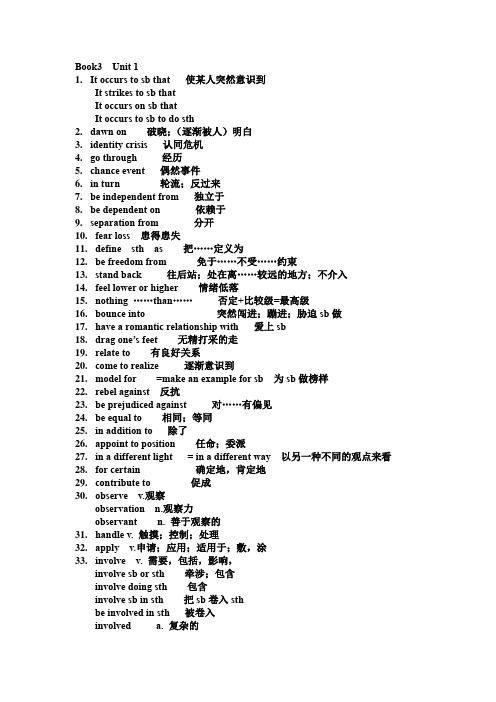
Book3 Unit 11.It occurs to sb that 使某人突然意识到It strikes to sb thatIt occurs on sb thatIt occurs to sb to do sth2.dawn on 破晓;(逐渐被人)明白3.identity crisis 认同危机4.go through 经历5.chance event 偶然事件6.in turn 轮流;反过来7.be independent from 独立于8.be dependent on 依赖于9.separation from 分开10.fear loss 患得患失11.define sth as 把……定义为12.be freedom from 免于……不受……约束13.stand back 往后站;处在离……较远的地方;不介入14.feel lower or higher 情绪低落15.nothing ……than……否定+比较级=最高级16.bounce into 突然闯进;蹦进;胁迫sb做17.have a romantic relationship with 爱上sb18.drag one’s feet 无精打采的走19.relate to 有良好关系e to realize 逐渐意识到21.model for =make an example for sb 为sb做榜样22.rebel against 反抗23.be prejudiced against 对……有偏见24.be equal to 相同;等同25.in addition to 除了26.appoint to position 任命;委派27.in a different light = in a different way 以另一种不同的观点来看28.for certain 确定地,肯定地29.contribute to 促成30.observe v.观察observation n.观察力observant n. 善于观察的31.handle v. 触摸;控制;处理32.apply v.申请;应用;适用于;敷,涂33.involve v. 需要,包括,影响,involve sb or sth 牵涉;包含involve doing sth 包含involve sb in sth 把sb卷入sthbe involved in sth 被卷入involved a. 复杂的involvement n. 牵扯;财政困难34.border issue n. 边境问题35.settle dispute 解决争端36.transport gas from sth 传输气体37.see to it 处理;照顾38.critical condition 危险期39.leave it aside 搁置;不考虑leave sb/sth behind 未能/忘记带…leave off 停止leave sth. off 不再穿某物leave it out 忽略;不提及leave sth over 推迟某事40.look at = look into 调查look up 仰视;改善look sth up 查阅(字典,参考书中)look sb up 看望或接触sblook ahead 计划未来look down upon 瞧不起look upon …as 把……视为41.set to 开始精力充沛的做sthset about doing 开始做sthset out to do 开始做sthset out sth 陈述sth42.sent out 派遣43.be content with 知足的44.be free from 摆脱45.interact with 与……相互作用Translation1.她打算申请那个学术工作。
现代大学英语听力第三册第1单元

Unit 1 Higher Educationtask2Now let me give you some idea of what you would see if you were to walk around Cambridge. Let us imagine that I am seeing the signs for the first time. It is a quiet market town and the shopping centre extends for quite a large area, but I notice more bookshops than one normally sees in country towns, and more tailors’shops showing in their windows the black gowns that students must wear--long gowns that hang down to the feet for graduates and shorter ones for undergraduates.In the centre of the town is the market place where several times each week country traders come to sell their produce. Everywhere there are teashops, some in modern and many in old buildings, reached by climbing narrow stairs. There is a great deal of bicycle traffic, mainly undergraduates who race along thoughtless of safety, with long scarves (in various colors to denote their college) wound round their necks.Continuing, I find my way to the river which flows behind the college buildings and curls about the town in the shape of a horseshoe. This narrow river is the Granta, and a little farther on changes its name to the Cam. It flows slowly and calmly. The “Backs;”as this part of the town behind the colleges is called, have been described as the loveliest man-made view in England. It is indeed beautiful. To the left, across the stream, there are no buildings, merely meadows, colleges’ gardens and lines of tall trees. Everything is very green and peaceful. On the river bank are willow trees with their branches bending into the water and, at intervals along the river, stone bridges cross the stream and lead into the colleges which line the right bank. The deep colored brick or stone of the college walls, sometimes red and sometimes grey, is 500 years old. The walls rise out of their own reflection in the water and their color contrasts charmingly with glimpses of the many green lawns.Walking along the river bank, where the only sound is the noise of the gentle wind in the tree tops, I came to my college, K ing’s College. Across a bridge and beyond a vast carpet of green lawn stands King’s College Chapel, the largest and most beautiful building in Cambridge and the most perfect example left of English fiftieth-century architecture.The colleges join one another along the curve of the river. Going through a college gate one finds one is standing in an almost square space of about 70 yards known as a “court”. Looking down into the court on all sides are the buildings where the students live. The colleges are built on a plan common to all. There is a chapel, a library, and a large dining-hall. One court leads to another and each is made beautiful with lawns or a fountain or charming old stone path. The student gets a good impression of all the English architectural styles of the past 600 years ---the bad as well as the good.There are 28 colleges, excluding three for women students. Women students do not play a very active part in university life at Cambridge, but they work harder than men.It is difficult to walk around the quiet courts of the colleges without feeling a sense of peace and scholarship. And the sense of peace that green lawns always suggest to me is found in the town too, for often one is surprised to meet open stretched of grass in the midst of the streets and houses giving a charmingly cool countryside effect and reminding one of the more graceful days of the eighteenth century .I’ll finish as I began on that note, the feeling one has here of the past in the present, of continuing tradition and firm faith.KEYA. a b a cB.1) They usually wear black gowns. Long gowns that hang down to the feet are forgraduates, and shorter ones for undergraduates.2) Women students do not play a very active part in university life at Cambridge, but theywork harder than men.C. 1) It is indeed beautiful .To the left, across the stream, there are no buildings, merely meadows, colleges’ gardens and lines of tall trees. Everything is very green and peaceful .On the river bank are willow trees with their branches bending into the water and, at intervals along the river, stone bridges cross the stream and lead into the colleges which line the right bank. The deep colored brick or stone of the college walls, sometimes red and sometimes grey, is 500 years old. The walls rise out of their own reflection in the water and their color contrasts charmingly with glimpses of the many green lawns.2) It is difficult to walk around the quiet courts of the colleges without feeling a sense of peace and scholarship. And the sense of peace that green lawns always suggest to me is found in the town too, for often one is surprised to meet open stretched of grass in the midst of the streets and houses giving a charmingly cool countryside effect and reminding one of the more graceful days of the eighteenth centuryTask 3On March 7, US Consul General David Hopper and three other officials from the Visa Section of the American Embassy met with students at Peking University .One of the officials presented “Five Secrets”for getting a student visa.Secret One:Get free, accurate information on applying for a student visa. Visit the US Embassy website. There is no charge for using these resources. Why pay to get the same information from other sources? Secret Two:Be thoroughly prepared .Make sure you bring:Your I-20 form (or IAP-66 form);Your diploma;Your standardized test score reports (TOEFL, GRE, GMA T, LSAT, etc);All letters and emails from the school, especially those that discuss scholarships, assistantships, fellowships and other forms of financial aidEvidence of funding for your studies (bank documents, etc);Your business cards (if you have a job);Any other documents that you think might be importantSecret Three:Answer those questions that are asked. Don’t give the visa officer a prepared speech! Here’s an example of what to avoidVisa officer: Hi, how are you today?Applicant: I’m going to study chemical engineering at X UniversityVisa officer: X University? I’ve been to the campus many times.Applicant: I will surely return to china and find a good job with a major multinationalcompany.Visa officer: So tell me, what color is the sky?Applicant: I was given a teaching assistantship because the school believes my test scores and credentials are excellent.These people are not communicating and the applicant is not advancing his cause!Secret FourTell the truth .If the visa officer thinks you’re lying, you won’t get a visaSecret FiveCome back to china. We mean that in two ways1: Come back to see your family and maintain your ties to China. Keep up your friendships and professional contacts here. Students returning on vacation don’t even need to come in for an interview; they can simply use the drop-box service offered at many CITIC Bank locations.2: Come back to China after you graduate. Use those advanced skills and theories that you learn in the US to make China a better placeKEYA. b cTask 4John: I disagree, Peter. I don’t think it really matters what your educational background is.Anyone who is bright enough is going to do well whatever their educationPeter: But John,…John:In fact, I think some people carry on with their education when they would do a lot better to get out and start building their own careers by learning things in real lifePeter: Yes, but the whole point is, life is getting so much more complicated these days that unless you carry on with your studies you just can’t copeJohn: For certain things, and certain people, okay .but to my mind, the big problem in education is that you specialize too quickly. I mean, in England, you start specializing from the third year in secondary school, when you’re about 14. And it gets steadily narrower until you do your A-level in only two or three subjects. You either do languages, or natural science, or social sciencePeter: But surely these days you have to John –you can’t possibly study everything, because there’s just too muchJohn: Yes, but how many kids at the age of 16 really know what they want to do? How many of them are convinced that the three subjects they’ve chosen, or have been recommended, are the ones that will let them follow the careers they eventually decide on?Peter: Oh, I think most young people who stay on at school have a fair idea of what they want to do.John: I’m not so sure, Peter. And after all ,that’s not the end of it .When they get to university in England ,the subjects they study are so narrow that they are only good for one things; so they are stuck with itPeter: But I don’t really see that there is any alternative if people are going to learn enough to be competent in their subject. They’ve got to specialize early, and I suppose those thatrealize they’ve made a mistake can always swap to something elseJohn: Ah, but that’s just it .You can’t .Suppose you study language at university and then decide that you are not cut out for it and would like to be a doctor .You’ve burnt your bridges.You can’t just change horses in midstream; you’ve got to go right back to the beginning and you lose years .I think the American system is much betterPeter: In what way?John: Well, for your first degree you’ve got to study a fairly wide range of subjects, and you can choose them yourself, within certain limitsPeter: Fine, but doesn’t that mean that American students with a first degree don’t have the depth of knowledge they should have?John: Should have for what?Peter: Well, they often aren’t accepted for postgraduate work in England with just a first degree. John: Maybe not, but I don’t really think that’s important. They come out with a pretty good general knowledge in a wide area .After all, when you think about a lot of the stuff English students have to study, what good is it to them afterwards? I’m sure the majority of British students never use 90 percent of what they studied at universityPeter: That maybe true of some arts subjects, but what about the science?John: Even there, a lot of what they do at university is so academic and abstruse that they will never be able to put it to any practical use. I’m sure they would benefit far more from on-the-job experience. And if they’ve had a broader course of study they’ve got two advantagesPeter: How do you mean?John: First of all, they will have a better understanding of the world in general, so they will be more flexible in their jobs, and then if things do go wrong they will be able to switch jobs more easilyPeter: That all sounds very simple, but I think you're still underestimating the amount of pure learning that you need these days, particularly in technical and scientific areas. I mean even at school these days, children have to learn far more things than we did when we were at schoolJohn: All the more reason why we should not try to concentrate on such a few things at such an early age. Things are changing so rapidly these days that we have to change with them.When we were younger, there was a pretty good chance that we would be able to carry on in the profession we’d chosen until we retired. But these days, people have got to be prepared to change their jobs and learn new skills as technology moves ahead. Take just the area of the office, for example. How many offices…KEYA.1) You are not well suited for it /You do not have the necessary qualities or abilities for it2) You cannot go back to the previous situation/you cannot change your mind3)You can’t change halfway the subjects you choose to studyB. b a c a a bC略Task 5That a record 572,509 foreign students from 180 countries attended colleges and universities in the US in the past academic year is perhaps the most vivid indication that there are important advantages in American higher education.No other country receives even half as many foreign students, yet international students represent only 3 percent of the total enrollment at US colleges and universities .In all ,some 15 million students attend America’s institutions of higher educationThese statistics illustrate four major features of the American higher education system which make it attractive to the domestic and foreign students: size, diversity, flexibility and accessibility.Today there are more than 3,600 institutions of higher education in the United States. Some of the large state university system, such as those in New York, California and Texas, comprise dozens of campuses and hundreds of thousands of enrolled students. Indeed, higher education has become one of the biggest “industries” in the US, employing some 3 million people The range and diversity of institution and program of study in the US are even more impressive. The system encompasses both prestigious private universities such as Harvard and Stanford, which are among the best in the world, and local publicly funded community colleges: both huge state university campuses enrolling 40,000-50,000 students and tiny private institutes with fewer than 100 students.American higher education is diverse in other ways, too. Not only do most colleges and universities enroll foreign students, but foreign faculties and visiting scholars play an important role on many campuses, particularly at the numbers of students and faculty from ethnic minorities, particularly Asian-Americans and Hispanic-Americans have been steadily increasing. As a result, the campus communities of many American universities reflect in microcosm the diversity of larger societyHigher education in the US is also unique in offering an enormous variety of subjects and course options, ranging from Aerospace Engineering to Women’s Studies and from Art to Zoology .Because it is dependent on tuition for funding, higher education in the US is student-centered and consumer-oriented: institutions teach what society as a whole thinks is useful .For example, the large public of different degree programs and have academic catalogues listing thousands of courses.The variety of programs and courses contributes to the flexibility of the American system. Undergraduates usually begin their program taking “general education”,“liberal arts”or “core curriculum” courses--in order that they might become more “well-rounded” students--and only later select their major in many cases, not until their second year.Because they do not specialize from the very beginning, undergraduate students have more options than their counterparts in other countries. Not infrequently, American undergraduates change their mind and decide to take a different major but this does not oblige them to start over, for at least part of their course work can still be applied to the new degreeMost academic programs include “elective course”which students can sometimes take outside their main field of study. This gives them added choice in planning their education, and enables them to broaden their perspective by learning about other subjects. Thus much is left up to the student, who is expected to choose from a bewildering variety of institutions, degree programs and courses, and often must depend on his /her academic advisers for help in planning a program of studyThe size, diversity and flexibility of the American higher education system all contribute to its accessibility. Americans take for granted that everyone, regardless of their origin, should have a right to a higher education, and opportunities do exist for a large percentage of college-age young people to pursue postsecondary studies. It should be remembered that in the US the category “higher education” can encompass vocational, technical, professinal and other specialized training Fundamental to American culture is the high value it places on education. At whatever level, education is considered a form of self-improvement, which can lead to new career opportunities, economic advances and personal betterment, regardless of one’s age. An increasing number of older ,”non-traditional “students are attending colleges and universities in the US, many having gone back including a large number of retires people ,enroll in noncredit college course (in other words, courses not leading to a degree)every yearKEYdomestic ,diversity ,flexibilitymore than 3,600campuses ,enrolled studentsabout 3 millionHarvard, Stanford community collegesstate universitiesfacultiesethnic minoritiessubjects and course optionsstudent consumerflexibilityspecialize elective coursesa higher educationpostsecondarya new careerretired peopleTask 6Part 1We know that something called “education” is a good thing. And all African states therefore spend a large proportion of government revenue on it. But, I suspect that for us in Africa the underlying purpose of education is to turn us into black Europeans, or black Americans, because our education policies make it quite clear that we are really expecting education in Africa to enable us to emulate the material achievements of Europe and America. We have not begun to think seriously about whether such material achievements are possible or desirable The primary purpose of education is the liberation of man .To “liberate” is to “set free”. It implies impediments to freedom having been thrown off. But a man can be physically free from restraint and still be unfree if his mind is restricted by habits and attitudes which limit his humanity.Education is incomplete if it enables man to work out elaborate schemes for universal peace but does not teach him how to provide good food for himself and his family. It is equally incomplete if it teaches man to be an efficient tool user and tool maker, but neglects hispersonality and his relationship with his fellow human beingsThere are professional men who say, “My market value is higher than the salary I am receiving in Tanzania.” But no human being has a market value ---except a slave. When people say such things, in effect they are saying, “This education I have been given has turned me into a marketable commodity, like cotton or sisal,” And they are showing that, instead of liberating their humanity by giving it a greater chance to express itself, the education they have received has degraded their humanity. Their education has converted them into objects----repositories of knowledge like rather special computersWe condemn such people .Yet it is our educational system which is instilling in boys and girls .the idea that their education confers a price tag on them ---which ignores the infinite and priceless value of a liberated human being, who is cooperating with others in building a civilization worthy of creatures made in the image of GodPart2A formal school system devised and operated without reference to the society in which its graduates will live, is of little use as an instrument of liberation for people of Africa. At the same time, learning just by living and doing in the existing society would leave us so backward socially and technologically that human liberation in the foreseeable future is out of the question. Somehow we have to combine the two systems. We have to integrate formal education with the society and use education as a catalyst for change in that societyInevitably it takes time to change. We have not solved the problem of building sufficient self-confidence t refuse what we regard as the world’ best(whatever that may mean), and to choose instead the most appropriate for our conditions. We have not solved the problem of our apparent inability education and life, and education and production. We have not solved the problem of overcoming the belief that academic ability marks out a child or an adult as especially praiseworthy, or as deserving a privileged place in societyThis is not a failure within the formal education system. It is a failure of society as a whole. Indeed, the educationalists have advanced in these matters more than other sections of the community. But our society has not yet accepted that character, cooperativeness and a desire to serve are relevant to a person’s ability to benefit from further trainingKEYA. b a a c bB. little use for the liberation of African peopleTo overcome the social and technological backwardnessformal education societyCatalyst social changeII. the world’s best the most appropriateIntegrate education and life, and education and productionThat we should judge a child or an adult by their academic abilityIII.The formal education system society as a wholeCooperativeness a desire to serveTask 7For beauty and for romance the first place among all the cities of the United Kingdom must be given to Oxford. The impression that Oxford makes upon those who, familiar with herfrom early years, have learnt to know and love her in later life is remarkable. Teeming with much that is ancient, she appears as the embodiment of youth and beauty .Exquisite in line, sparkling with light and color, she seem ever bright and young, while her sons fall into decay and perish. “Alma Mater!”they cry, and love her for her loveliness, till their dim eyes can look on her no moreAnd this is for the reason that the true livableness of Oxford cannot be learnt at once. As her charms have grown from age to age, so their real appreciation is gradual. Not that she cannot catch the eye of one who sees her for the first time, and smiling, hold him captive, This she can do now and then; but even so her new lover has yet to learn her preciousness。
现代大学英语精读3lesson1 your college_years

Lesson 1 – Your College Years
Myths and Facts Regarding College Experience
College years are times of significant transition and challenge for an individual. Transition simply means change. Higher levels of anxiety are always experienced by people who are in a state of transition regardless of whether the change is perceived as good or bad. The following are some of the myths vs. the facts regarding college experience.
It’s the season of growth.
III. On Seasons in College
Summer is the season for flowers to bloom, and it’s the season for you to enjoy the greatest passion in nature — love, love from your classmates, from your teachers and from your romance.
Warm-up Contents
I. Warm-up Questions II. Myths and Facts Regarding
College Experience III.On Seasons in College
现代大学英语精读第3册lesson 1(课堂PPT)
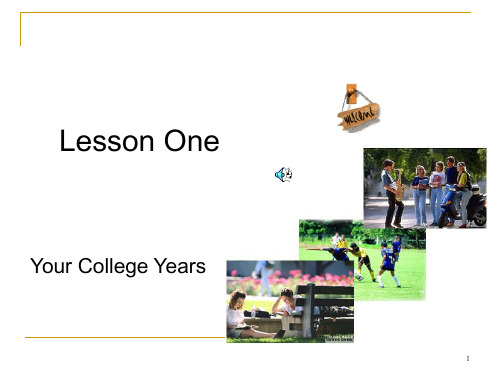
Your College Years
1
Consider the following questions:
What’s the difference between middle school life and college life?
What important changes have happened to you? What problems /difficulties have you come cross? Were you happy in the past year? List your progress/success and your loss/failure in
It (suddenly / never) occurs to someone that… It (suddenly / gradually) dawned on someone
that… It struck someone that…
14
2. From adolescence to young adulthood (para.1)
psychological independence (para.4)
1. Functional independence (4 aspects) 2. Attitudinal independence 3. Emotional independence 4. Relationship independence
the past year. Have you had a better understanding of your
strengths and your weakness?
2
Background Information
现代大学英语精读3_unit_1课后答案
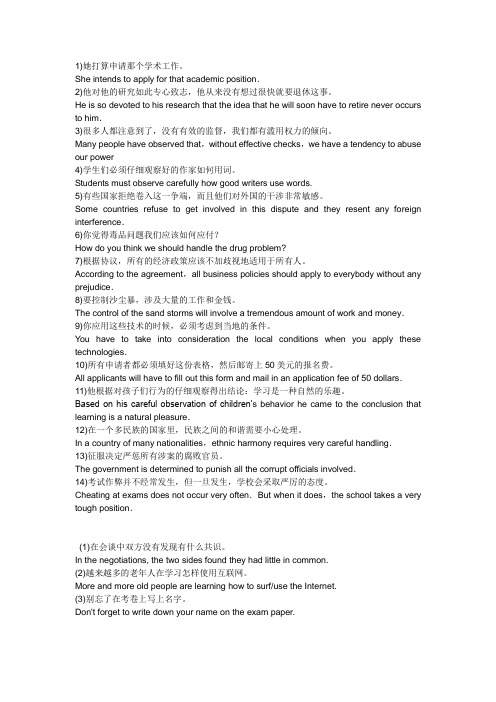
1)她打算申请那个学术工作。
She intends to apply for that academic position.2)他对他的研究如此专心致志,他从来没有想过很快就要退休这事。
He is so devoted to his research that the idea that he will soon have to retire never occurs to him.3)很多人都注意到了,没有有效的监督,我们都有滥用权力的倾向。
Many people have observed that,without effective checks,we have a tendency to abuse our power·4)学生们必须仔细观察好的作家如何用词。
Students must observe carefully how good writers use words.5)有些国家拒绝卷入这一争端,而且他们对外国的干涉非常敏感。
Some countries refuse to get involved in this dispute and they resent any foreign interference.6)你觉得毒品问题我们应该如何应付?How do you think we should handle the drug problem?7)根据协议,所有的经济政策应该不加歧视地适用于所有人。
According to the agreement,all business policies should apply to everybody without any prejudice.8)要控制沙尘暴,涉及大量的工作和金钱。
The control of the sand storms will involve a tremendous amount of work and money.9)你应用这些技术的时候,必须考虑到当地的条件。
现代大学英语精读3unit1教案
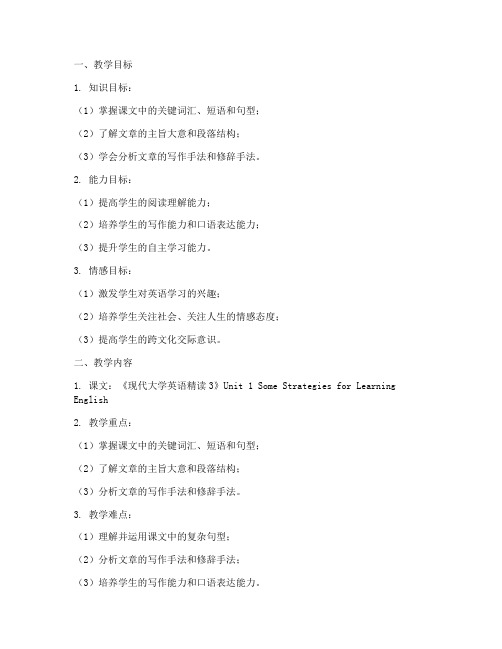
1. 知识目标:(1)掌握课文中的关键词汇、短语和句型;(2)了解文章的主旨大意和段落结构;(3)学会分析文章的写作手法和修辞手法。
2. 能力目标:(1)提高学生的阅读理解能力;(2)培养学生的写作能力和口语表达能力;(3)提升学生的自主学习能力。
3. 情感目标:(1)激发学生对英语学习的兴趣;(2)培养学生关注社会、关注人生的情感态度;(3)提高学生的跨文化交际意识。
二、教学内容1. 课文:《现代大学英语精读3》Unit 1 Some Strategies for Learning English2. 教学重点:(1)掌握课文中的关键词汇、短语和句型;(2)了解文章的主旨大意和段落结构;(3)分析文章的写作手法和修辞手法。
3. 教学难点:(1)理解并运用课文中的复杂句型;(2)分析文章的写作手法和修辞手法;(3)培养学生的写作能力和口语表达能力。
(一)导入1. 复习上一节课的内容,回顾所学知识;2. 引导学生思考:学习英语有哪些方法?(二)课文精读1. 词汇学习:(1)讲解课文中的重点词汇、短语和句型;(2)引导学生运用所学词汇进行造句;(3)进行词汇测试,巩固所学知识。
2. 理解课文:(1)分析课文的主旨大意和段落结构;(2)引导学生总结文章的写作手法和修辞手法;(3)组织学生进行讨论,加深对课文的理解。
(三)拓展练习1. 阅读相关材料,了解英语学习策略;2. 学生分组讨论,分享自己的学习经验;3. 鼓励学生运用所学知识进行写作和口语表达。
(四)课堂小结1. 回顾本节课所学内容;2. 强调学习英语的重要性;3. 布置课后作业,巩固所学知识。
四、课后作业1. 阅读课文,熟读并背诵重点段落;2. 按照课文内容,写一篇关于英语学习策略的短文;3. 收集英语学习资料,为下一节课做好准备。
五、教学反思1. 教师在教学中应注重激发学生的学习兴趣,引导学生主动参与课堂活动;2. 注重培养学生的自主学习能力,鼓励学生在课后进行拓展学习;3. 关注学生的个体差异,因材施教,使每个学生都能在英语学习中取得进步。
现代大学英语精读三unit1教案
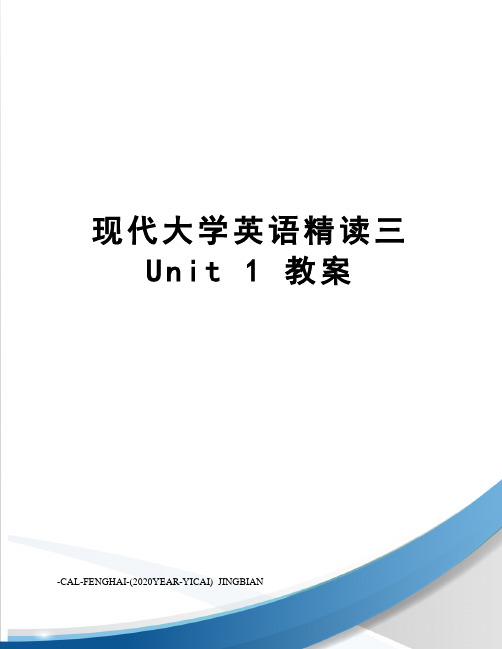
现代大学英语精读三U n i t1教案-CAL-FENGHAI-(2020YEAR-YICAI)_JINGBIAN教案一:Unit 1 Your College YearsI. Teaching PlanThis essay is planned to finish in 20 minutes.1-3 mins Warming-up & Pre-reading4-17 mins While-reading18-20 mins Post-readingII. Teaching Aims:1. Knowledge aims(1) Students can understand and master the new words and expressions.(2) Students can master the main grammar.2. Ability aims(1) Students can understand the main idea through listening to tape.(2) Students can express their attitudes toward the article in English.(3) Enhance students' reading ability and skills of guessing new words in context.3. Emotion aims(1) Help students to understand the university life(2) Improve students' sense of cooperative learning.III. Teaching Methods:Task-based method, Grammar-translation method.IV. Teaching Difficult / Key Points:1. GrammarParallel structure, Object clause2. Writing techniquesV. Teaching Contents:Step 1: Warming upLead in the topic by providing some basic backgrounds.1. BackgroundAuthor -- Bob HartmanBob Hartman is a storyteller of children and part - time pastor. He was born in Pittsburgh in the United States.(Justification: Help students to know about the author and understand the essay better.)Step 2: Pre-readingAsk students to have a free talk:1.In the 1st college year, did you experience anything different from that in highschool2.What do you think about these differences?(Justification: Arouse interest of students.)Step 3: While-reading1. New Words(1)Endeavor v. to try very hardeg. He endeavored to claim himself down but in vain.辨析:Endeavor强调愿望发自内心以及用异乎寻常的极大努力去做某事,尤指克服困难。
现代大学英语精读第3册lesson_1课件
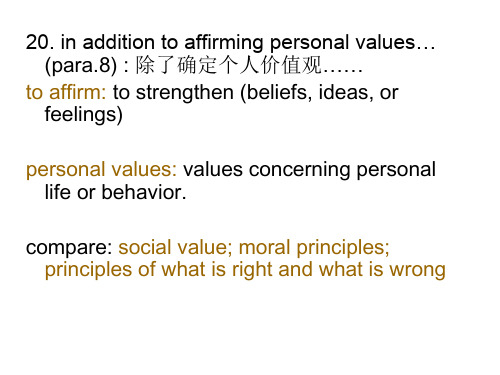
3. going through (para.2) : experiencing; undergoing; suffering Other uses of this phrasal verb:
Harry believed that he could go through walls by saying those magic words. I don’t think this plan will go through the Security council. (be accepted by) We have gone through all these papers. (go over carefully from beginning to end)
5. To perceive(para.2): a. To think of as He perceived himself a loser who could not even support his family. a. To notice; to discover; to observe Musicians can perceive very small differences in sounds. a. To understand; to grasp I gradually perceived that culture and language cannot really be separated.
psychological independence (para.4)
1.
2.
3. 4.
Functional independence (4 aspects) Attitudinal independence Emotional independence Relationship independence
现代大学英语3-Unit-1-Your-College-Life-词汇精讲
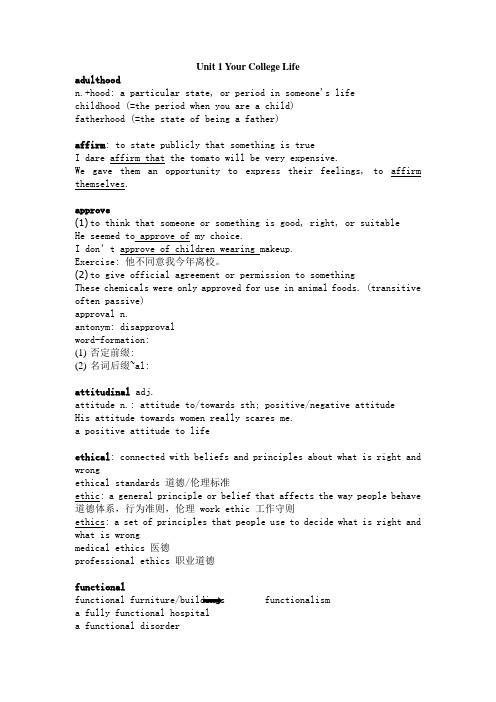
Unit 1 Your College Lifeadulthoodn.+hood: a particular state, or period in someone's lifechildhood (=the period when you are a child)fatherhood (=the state of being a father)affirm: to state publicly that something is trueI dare affirm that the tomato will be very expensive.We gave them an opportunity to express their feelings, to affirm themselves.approve(1)to think that someone or something is good, right, or suitableHe seemed to approve of my choice.I don’t approve of children wearing makeup.Exercise: 他不同意我今年离校。
(2)to give official agreement or permission to somethingThese chemicals were only approved for use in animal foods. (transitive often passive)approval n.antonym: disapprovalword-formation:(1)否定前缀:(2)名词后缀~al:attitudinal adj.attitude n.: attitude to/towards sth; positive/negative attitudeHis attitude towards women really scares me.a positive attitude to lifeethical: connected with beliefs and principles about what is right and wrongethical standards 道德/伦理标准ethic: a general principle or belief that affects the way people behave 道德体系,行为准则,伦理 work ethic 工作守则ethics: a set of principles that people use to decide what is right and what is wrongmedical ethics 医德professional ethics 职业道德functionalfunctional furniture/buildings functionalisma fully functional hospitala functional disorderfunction: n./v.He functioned as ambassador.The hospital functioned normally.contribute v. contribution n.They say they would like to contribute more to charity, but money is tight this year.Medical negligence was said to have contributed to her death.He contributes regularly to the sports magazine.He is a regular contributor to the magazine.counsel v./nShe has spent five years counselling rape victims. (to counsel sb.)He counselled them to give up the plan. (to counsel sb. to do sth.) Most experts counsel caution in such cases. (to counsel sth.)a counsel of despaira counsel of perfectioncrisisfinancial/economic/political crisisthe current crisis in the farming industryWe admit that the nursing profession is in crisis.a mid-life crisisendeavor v./n.We always endeavor to please our customers.We will make every endeavor to find the two boys.endow v.① to give a large amount of moneyto endow a scholarship/program/project② to equip or supply with a talent or qualityNature endowed her with a beautiful voice.She was endowed with both good looks and brains.endowment n.He is a man of great endowments.Word formation: v.+ment=n.resent v.to feel bitter or angry about sth, especially because you feel it is unfair I strongly/deeply/bitterly resented her criticism. (resent sth.)The children resented the new woman in their father’s life. (resent sb.) He bitterly resented being treated like a child. (resent doing sth.) resentment: n. an angry unhappy feeling you have when you think you havebeen treated unfairly or without enough respectThe boy has felt/borne/harbored a deep-seated resentment towards/against his step-mother.synonyms: anger, hatred, indignation, rageexcessive: adj. much more than is reasonable or necessary; extreme Excessive drinking is harmful to your health.Crops were destroyed by the excessive rainfall.excessively adv.excess n.An excess of fat in one’s diet can lea d to heart disease.feminine: having the qualities or appearance considered to be typical of women; connected with womenfeminine institutionmasculinefemale/malegenetic: connected with genesgeneticsgenetically modified foodheighten: to become stronger or increaseinterest/tension/feeling heightens~en: v. to make or becomeblacken, strengthen, widen, sadden, lengtheninheritHe’s inherited his father’s nose.He inherited these paintings from his father.inheritance n.heritage: the art, buildings, traditions, and beliefs that a society considers important to its history and culturecultural/musical/national heritageinhibit v.Recording the meeting may inhibit people from expressing their real views. An unhappy family life may inhibit children’s l earning.inhibition n.The whole point about dancing is to stop thinking and lose all your inhibitions.interact v.Teachers have a limited amount of time to interact with each child. The immune system interacts with the nervous system.interaction n.word formation: inter/intrainter: between; from one to anotherinternational, internet, interstate, intermarriageintra: within sth.intranet, intrastate, intranationalinternalize v.internal: adj.: connected with the inside of sth./your bodythe internal structure of the buildinginternal organThe medicine is for internal use.antonym: externalthe external wallsher external appearanceword formation:~izeinternationalize, industrialize, Americanize, internalize, externalize…option n.: a choice you can make in a particular situationThe government has two options: to reduce spending or to increase taxes. This was not the only option open to him.keep/leave your options open: to wait before making a decisionI’m keeping all my options open for the momen t.optional adj.: that you can choose to do or have if you want to optional coursescompulsory coursespeer: a person who is the same age or who has the same social status as youAmerican children did less well than their peers in China.Peer review system is being introduced to help teachers who are experiencing difficulty. (同行评估,同侪审查)perceive v.①to understand or think about something in a particular wayEven as a young woman she had been perceived as a future chief executive. (perceive sth/sb as sth)Children who do badly in school tests often perceive themselves to be failures. (perceive sb/sth to be sth)② to notice, see, or recognize sth.During the break, the coach perceived a change in her players’ mood.Cats are not able to perceive color.I gradually perceive that culture and language cannot be separated. perception n.perceptive adj.process v.28, 000 applications for travel visas have still to be processed. Data is processed as it is received.processed meatthe food processing industryproject v.The next edition of the book is projected for publication in March. The unemployment rate is projected to fall.The edges of the roof project outward and keep the rain away from the wall. Their wedding photos were projected on the screen.a slide projectorThe blast projected huge stones through the air.theologyquestion v.① to ask questions② to have/express doubtsquestionable: that can be questionedunquestionable: that cannot be questionedwardrobe① a piece of furniture where you can hang your clothes② the clothes that sb. haswinter/summer wardrobe(注:可编辑下载,若有不当之处,请指正,谢谢!)。
(完整版)YourCollegeYears现代大学英语Book3Unit1
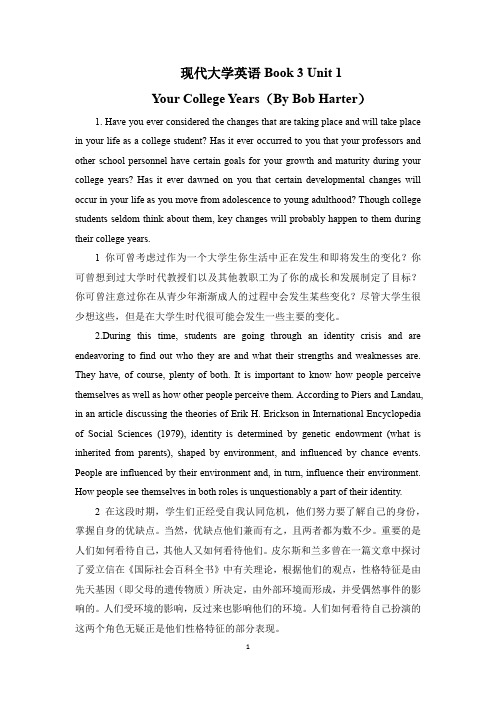
现代大学英语Book 3 Unit 1Your College Years(By Bob Harter)1. Have you ever considered the changes that are taking place and will take place in your life as a college student? Has it ever occurred to you that your professors and other school personnel have certain goals for your growth and maturity during your college years? Has it ever dawned on you that certain developmental changes will occur in your life as you move from adolescence to young adulthood? Though college students seldom think about them, key changes will probably happen to them during their college years.1你可曾考虑过作为一个大学生你生活中正在发生和即将发生的变化?你可曾想到过大学时代教授们以及其他教职工为了你的成长和发展制定了目标?你可曾注意过你在从青少年渐渐成人的过程中会发生某些变化?尽管大学生很少想这些,但是在大学生时代很可能会发生一些主要的变化。
2.During this time, students are going through an identity crisis and are endeavoring to find out who they are and what their strengths and weaknesses are. They have, of course, plenty of both. It is important to know how people perceive themselves as well as how other people perceive them. According to Piers and Landau, in an article discussing the theories of Erik H. Erickson in International Encyclopedia of Social Sciences (1979), identity is determined by genetic endowment (what is inherited from parents), shaped by environment, and influenced by chance events. People are influenced by their environment and, in turn, influence their environment. How people see themselves in both roles is unquestionably a part of their identity.2在这段时期,学生们正经受自我认同危机,他们努力要了解自己的身份,掌握自身的优缺点。
- 1、下载文档前请自行甄别文档内容的完整性,平台不提供额外的编辑、内容补充、找答案等附加服务。
- 2、"仅部分预览"的文档,不可在线预览部分如存在完整性等问题,可反馈申请退款(可完整预览的文档不适用该条件!)。
- 3、如文档侵犯您的权益,请联系客服反馈,我们会尽快为您处理(人工客服工作时间:9:00-18:30)。
MoreWork on the TextⅡ Vocabulary1. Translate. (P141 From English into Chinese.(1学校教职员工 (10青春期(2政治上的成熟 (11种族偏见(3成长过程中的变化 (12每天工作日程(4认同危机 (13伦理道德观念(5恋爱关系 (14处理日常生活的能力(6遗传工程 (15历史背景(7学术生活 (16异性(8偶然事件 (17感情上的支持(9民族认同 (18生活方式2 From Chinese into English.(1 to pursue an education (10 to drag one's feet(2 to acquire knowledge (11 to evaluate the result(3 to handle the case (12 to process knowledge(4 to define the word (13 to perform one's duty(5 to select one's major (14 to narrow the gap(6 to resent the treatment (15 to expand business(7 to establish their identity (16 to expect better results(8 to frustrate the students (17 to assemble cars(9 to declare war (18 to present facts2. Give synonyms and antonyms of the following. (P15 1 Give synonyms.(1 objective, purpose, end (7 choice(2 to happen (8 to choose/to pick orpick out(3 to increase/to enlarge/to grow/to develop (9main/chief/principal/leading(4 to try/to attempt/to make an effort (10 belief(5 clear (11 strong feeling(6 magazine (12 to get/to gain/toobtain2 Give antonyms.(1 masculine (9 to exclude(2 immature (10 disapproval(3 independence (11 mistrust/distrust(4 inferior (12 inequality(5 incompetent (13 to discourage(6 minor (14 to grow/to increase/to expand/todevelop(7 to narrow (15 indistinct/unclear/vague(8 innocence (16 impractical/unpractical/theoretical3. Fill in the blanks with the appropriate words in their proper forms listed below. (P151 handle 5 observant, occurrence 9 occurred,apply2 occurrence 6 observation, observed, occur 10 observers,handled3 handle 7 involve 11involvement4 involved 8 application 12 observation4. Translate. (P161 She intends to apply for that academic position.2 He is so devoted to his research that the idea that he will soon have to retire never occurs to him.3 Many people have observed that, without effective checks, we have a tendency to abuse our power.4 Students must observe carefully how good writers use words.5 Some countries refuse to get involved in this dispute and they resent anyforeign interference.6 How do you think we should handle the drug problem?7 According to the agreement, all business policies should apply to everybodywithout any prejudice.8 The control of the sand storms will involve a tremendous amount of work andmoney.9 You have to take into consideration the local conditions when you apply thesetechnologies.10 All applicants will have to fill out this form and mail in an application fee of50 dollars.11 Based on his careful observationof children's behavior he came to the conclusionthat learning is a natural pleasure.12 In a country of many nationalities, ethnic harmony requires very carefulhandling.13 The government is determined to punish all the corrupt officials involved.14 Cheating at exams does not occur very often. But when it does, the school takes a very tough position.5. Fill in the blanks with the most appropriate word. (P161 C. 3 B. 5 B. 7 D. 9 B. 11 A. 13 D. 15 B. 17A.2 A. 4 A./D. 6 D. 8 A. 10 C. 12 C. 14 A. 16 D. 18 D.6. Choose the right word in their proper forms. (P181 (1 object (2 objectives (3 objective (4 objective (5 objects2 (1 requires (2 requires (3 acquire (4 acquire (5inquire3 (1 entrusted (2 entrusted (3 trust (4 believe (5 trust4 (1 repaid (2 pay, repay (3 place (4 repay (5placed, replaced5 (1 anxious (2 anxiously (3 eager (4 eager/anxious (5eager/anxious7. Choose the best word or phrase for each blank from the four supplied in brackets. (P19(1 suggested (4 but (7 eventually (10 what (13derive(2 primarily (5 remained (8 regrets (11 where (14lacking(3 told (6 consisted (9 pursuing (12 Although (15droppingMoreWork on the TextⅢ Grammar1. Observe these sentences and identify the object of the italicized verb or preposition,and find out how it is expressed. (P201 them: pronoun2 who they are and what their strengths and weaknesses are: two wh -clauses3 to enter the work world: an infinitive phrase4 that there are four distinct aspects to psychological separation from one'sparents: a that -clause5 where they are in the independence/dependence struggle: a wh -clause6 how to give and receive affection in the adult world: a wh -clause7 very little: pronoun8 how they react to new knowledge and new ways of learning, how they processthe knowledge presented to them, and how they organize this knowledge:three wh -clauses9 shuddering: a gerund10 drifting down: a gerund phrase11 herself: a reflective pronoun12 how to let loose a plague capable of destroyingwhole nations: wh -word + toinfinitive13 what to say: wh -word + to-infinitive14 whether it had been storming for three or four days: a noun clause introducedby “ whether ”15 (need charity: a noun; (help themselves: a reflexive pronoun; (told Millard: a proper noun2. Practice using correct object forms. (P211 Complete the sentences with one appropriate word.(1 what (3 what (5 it (7 why (9 everything(2 yourself (4 whether (6 others (8 which/how (10 much2 Choose the right form, the infinitive or the gerund of the verb in brackets, forthe blanks.(1 feeling (4 being; being/to be (7 to stay (10 being recognized(2 to change (5 to go (8 not to see(3 becoming (6 thinking (9 having fallen behind3 Translate these sentences into English.(1 In the negotiations, the two sides found they had little in common.(2 More and more old people are learning how to surf/use the Internet.(3 Don't forget to write down your name on the exam paper.(4 We must bear in mind that there is no shortcut in learning.(5 He never regretted having shifted from business to politics.(6 I ’ d like to have a chat with you about your term paper sometime this week.(7 Like sports, learning a foreign language requires a lot of practice.(8 They all remember where they were when they heard the shocking news.(9 People learn little from victory, but much more from defeat. (10 Whenever you face a decision you have three choices: do what you please;do what others do; or do what is right.3. Summarize how the word “ way ” is modified/qualified in these sentences. (P22the way + clause = the way in which + clause: 1, 6a way/the way(s + to-infinitive phrase (referring to an activity in a specific way:2, 3, 8a way/the way/ways + of + gerund noun (referring to an activity in a general way: 4, 5, 7But in many cases, the difference betw een “ a/the way to do sth.” and “ a/the wayof doing sth.” is blurred. The choice is rather a matter of idiomatic usage.4. Complete these sentences by translating the Chinese in brackets, using the word“ way ” .(P221 a poet's way of telling us2 the only way to learn a foreign language well3 no easy way to say good-bye4 the way they all stared at me5 some aspects of the way we speak6 (many ways to get data into a computer7 The way I judge it8 a way of delivering the secret message9 a way to stop the leak10 the way the children responded to their questions5. Put in appropriate determiners where necessary using a “ /” when none is needed.(P23a, his, a, his, the, an, The, the/a, a, the, the, The, the, /, The, his, the, the6. Complete each of the following sentences with the most likely answer. (P231 D. 3 A. 5 B. 7 A. 9 D. 11 C. 13 A.15 A.2 C. 4 D. 6 D. 8 B. 10 B. 12 B. 14 C.(In colloquial English, A is possible for No. 12.MoreWork on the TextⅣ WrittenWorkAnswer the question in about 150 words. (P24In what ways, according to the writer of the article, is college a time of growth andexpansion?College life is an important period in one's life. Although the college students seldomthink about that the key changes will probably happen to them during their collegeyears.During this time, students are going through an identity crisis which includesindependence/ dependence struggle from their parents. And also, the most important thing is establishing their sexual identity. At the same time, these youngsters are learning how to give and receive affection in the adult world. What's more, they establish their personal and social identity. They are affirming their personal values such as religious faith, moral and ethical values and developing new ways to organize and using the academic knowledge as well as their world knowledge. In a word, college students can begrowing in their understanding of themselves, others and the world in which they lives. Poemof theWeek About the Poet 依里诺尔·法吉恩(1881-1965)生于伦敦,由私人家庭教师授课。
